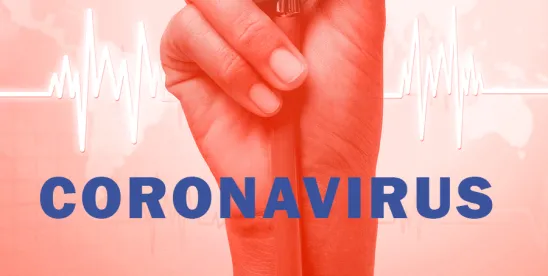The current crisis mode has triggered legal and commercial issues that affect the pharmaceutical and medical device industry across Europe.
CLINICAL TRIALS NOT RELATED TO COVID-19
The European Medicines Agency (EMA), together with the European Commission and the Heads of Medicines Agencies (HMA), on 20 March 2020 published an initial Guidance on the Management of Clinical Trials during the COVID-19 pandemic, followed on 25 March by additional points to consider. Sponsors should question whether or not they need to start a new clinical study or include new study participants in an ongoing study; consider whether the study could be temporarily suspended or its overall duration extended; and determine if the conduct of the study could be modified. The French drugs agency, the Agence Nationale de Sécurité du Médicament (ANSM) has published a Q&A with recommendations for ongoing clinical trials being conducted in France. The ANSM invites sponsors to email specific questions to questions.clinicaltrials@ ansm.sante.fr or ccs-pole-recherche@sante.gouv.fr.
The German Federal Institute for Drugs and Medical De-vices (BfArM) and the Paul-Ehrlich-Institut (PEI) are currently prioritising the processing of amendment notifications required by COVID-19. BfArM has summarised the relevant guidance on its website and set up a dedicated email address for inquiries about clinical trials in connection with COVID-19: CT-COVID@bfarm. de. On 26 March 2020, BfArM published supplementary recommendations to EMA’s guidelines.
The UK Medicines and Healthcare products Regulatory Agency (MHRA) has published guidance on Managing clinical trials during Coronavirus (COVID-19). Parties are asked to submit applications for clinical trials relating to COVID-19 directly to the Clinical Trial Helpline (clintrialhelpline@mhra.gov.uk).
ACCELERATED MARKET ACCESS FOR DRUGS TO TREAT COVID-19
At EU level, the Priority Medicine (PRIME) system enables accelerated assessment and granting of conditional approval for priority medicines. The EMA offers free scientific advice for the benefit of companies developing vaccines or therapeutics against COVID-19 via 2019-ncov@ema.europa.eu.
The EMA’s Guidance on the Management of Clinical Trials specifically addresses the launch of new clinical trials for treatments of COVID-19, and requests the use of large, multinational trial protocols in line with the call by the Committee for Medicinal Products for Human Use for robust trial methodology in clinical trials for potential COVID-19 treatments or vaccines.
In line with World Health Organisation requests, parties should ensure that the official acronym for the Coronavirus (COVID-19) is entered in the title field of the trial registration data set to facilitate finding and extracting clinical trials from public databases.
For products intended for use in emergency situations, reduced pharmaceutical and non-clinical data may be accepted. The EMA and national regulators will assess whether or not public health would benefit from immediate availability, and whether or not that benefit is greater than the risk posed by accepting less than the usually required evidence of safety and efficacy.
The ANSM has implemented accelerated procedures for the initial assessment of authorisation requests for clinical trials related to COVID-19. The ANSM recommends that trial managers submit an authorisation request as soon as possible and contact the French Ministry of Health (the DGOS) before the finalisation of the initial authorisation procedure.
BfArM and PEI currently give priority to projects that relate to the diagnosis and/or treatment of COVID-19. BfArM and PEI accept successive submission of marketing authorisation application documents in order to speed up the review of the application. The consultation fee in relation to COVID-19 treatment can be reduced to a quarter of the statutory fees. The MHRA said on 23 March 2020 that it is working closely with the Department of Health and Social Care and other healthcare partners on COVID-19, and is prioritising certain fields, including the development of vaccines and the launch of clinical trials for new medicines, and managing the supply of medicines and healthcare products. MHRA’s Guidance can be found here
MARKET ENTRY FACILITATION
The market entry of personal protective equipment (PPE) usually requires a—sometimes lengthy— conformity assessment and Conformité Européene (CE) marking.
On 3 April, the Commission issued Guidance on medical devices, active implantable medical devices and in vitro diagnostic medical devices in the COVID-19 context, confirming that the public health crisis associated with the COVID-19 outbreak justifies derogation from the normal conformity assessment procedures for PPE and certain medical devices. There is, however, still a need to be attentive to falsified certificates and counterfeit devices and Member States should take appropriate market surveillance measures.
The Commission has also published several guidelines to assist companies in the legal and regulatory assessment of PPE, hand sanitisers, 3D printers and products made by 3D printers. The European Committee for Standardization and the European Committee for Electrotechnical Standardization have also provided a large number of free relevant standards, which are available on the websites of the respective member associations at the Member State level.
EXPORT AND IMPORT OF PPE AND SELECTED MEDICAL DEVICES
The Commission, in Regulation (EU) 2020/402 of 14 March 2020, temporarily made the export of certain products, including protective goggles and visors, face shields, oral and nasal protective equipment, and protective clothing and gloves, subject to authorisation until 26 April 2020. During that period, an export license would only be issued in special, individual cases.
These new export restrictions are problematic for companies whose products fall within the scope of the Regulation but are contractually obliged to supply these products to third countries. Companies will have to assess whether an export license can be considered and, if not, what legal and other options exist to deal with the export ban.
On 3 April 2020, the European Commission agreed to temporarily waive customs duties and VAT on the import of medical devices, and protective equipment, from third countries.
HOARDING OF AND PROFITEERING FROM RESTRICTED MEDICINES AND PRODUCTS
To prevent hoarding and profiteering, European Governments have taken some extraordinary steps. The situation is as follows at the date of publication.
An order adopted on 23 March 2020 limited the sale of non-prescription paracetamol, ibuprofen and acetylsalicylic acid (aspirin) until 11 May 2020. Online sale of such products has been suspended until further notice.
By a Decree dated 23 March 2020, the French Government can requisition until 31 May 2020 existing masks, and those in production between 14 March and the date on which the health emergency ends. The same Decree allows for stocks of imported masks above a threshold of five million units per quarter per company to be entirely or partially requisitioned by order of the Minister for Health.
The French government further tackled the increase in selling prices (profiteering) of hydro-alcoholic gels caused by the COVID-19 outbreak by capping both wholesale and retail prices until 31 May 2020.
The website www.stopcovid19.fr allows manufacturers and distributors of essential products and equipment to distribute those items to health professionals and public institutions. On 20 March 2020, BfArM published an allocation order requesting that pharmaceutical companies and wholesalers not supply drugs beyond the usual demand in order to counteract stockpiling that leads to an unequal distribution of drugs in the market.
The order applies to “supply-relevant drugs”, which include prescription drugs with an active ingredient that is particularly relevant to public health. Pharmaceutical companies should examine to what extent their drugs are affected by the allocation order. On 20 March 2020, the UK Government expanded the list of medicines that cannot be parallel exported from the United Kingdom or hoarded, which now includes adrenaline, insulin, paracetamol and morphine.
On 20 March 2020, the UK Government expanded the list of medicines that cannot be parallel exported from the United Kingdom or hoarded, which now includes adrenaline, insulin, paracetamol and morphine.
Companies can continue to withhold medicines to maintain Brexit stockpiles and as part of stock management arrangements agreed with marketing authorisation holders.
IMPENDING SUPPLY BOTTLENECKS
For several weeks now, attention has been turning anxiously to China, which supplies raw ingredients to other countries. In addition, the Indian Government has recently limited the export of 26 pharmaceutical ingredients, including paracetamol, certain antibiotics, progesterone, and vitamins B12, B1 and B6.
Pharmaceutical companies should keep an eye on production networks and supply chains relevant to them and, where possible, ensure that they do not depend exclusively on individual suppliers. If there is a risk of a supply bottleneck, pharmaceutical companies should review their rights under the respective contracts in order to at least limit adverse commercial effects.
MORATORIUM FOR THE MDR REGULATION
The Medical Devices Regulation (MDR), which was supposed to come into effect on 26 May 2020 for one year, was postponed on 17 April 2020 until 26 May 2021; notified bodies remain assigned under the current law, the Medical Devices Directive (MDD), until then. The transition period for medical devices with MDD certificates will remain unchanged and expire on 26 May 2024.
For the most up to date information on this rapidly evolving situation, click here for France, here for Germany and here for the United Kingdom.






 />i
/>i
